Reviews of UCL Neuroscience events, issues and news
2017 UCL Neuroscience Symposium
Written by Oriol Pavon, Wellcome Trust PhD student in Neuroscience
Now in its 8th year, the UCL Neuroscience Symposium is the perfect occasion to catch up with the latest developments of our colleagues and establish new collaborations. Over 800 researchers and a gender-balanced line up of speakers gathered to share and discuss some of the exciting scientific breakthroughs that UCL has seen over the past year.
The event kicked off with an unplanned outdoor networking session caused by a fire alarm, thankfully false. Professor Richard Morris of the University of Edinburgh, who shared the 2016 Brain Prize, then delivered a fantastic talk on 'The synaptic plasticity and memory hypothesis'.
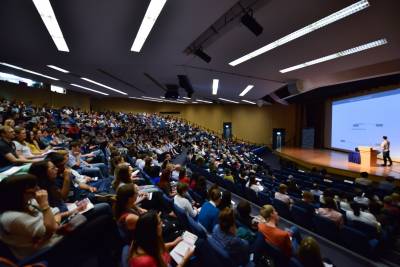
Professor Ray Dolan, awardee of the 2017 Brain Prize, introduced the winners of the Jon Driver Prize. Established to honour the memory of the late Professor Jon Driver, former director of the Institute of Cognitive Neuroscience, this year's prize was awarded to three outstanding young neuroscientists from UCL who took the stage to briefly present their work.
Next a poster session, with over 150 lab and research posters showcased in three different halls, allowed PhD students, post-docs and group leaders to present and discuss their research in an amiable atmosphere.
Professor Kenneth Harris chaired the first session of UCL speakers. Dr Jennifer Bizley delivered a talk on "How does seeing improve listening?", showing how visual cues can be decisive to discriminate between different overlapping sounds.
We then heard from Professor Jernej Ule and his work on recursive splicing of RNA from long genes in the brain and its potential implications for the biology of neurons.
Dr Tamar Makin gave a powerful talk on 'Brain plasticity in amputees', debunking some textbook knowledge with her research on the representation of missing limbs in the brain of amputees and how to take advantage of it to advance neuroprosthetics.
We heard from the winners of this year's Early Career Prize, awarded to recognise outstanding work published in the past year by early career UCL neuroscientists.
Dr Karin Tuschl was awarded the prize in the Junior Category for her work identifying the genetics of childhood-onset parkinsonism-dystonia, developing a zebrafish model to understand the aetiology of the disease in the lab, and then using the knowledge gained from basic research to translate it to a therapy back in the clinic.
In the Advanced Category, Dr Aude Marzo won the prize with her research on Wnt signalling and reversal of synapse degeneration, and its potential application to improve the symptoms of Alzheimer's Disease.
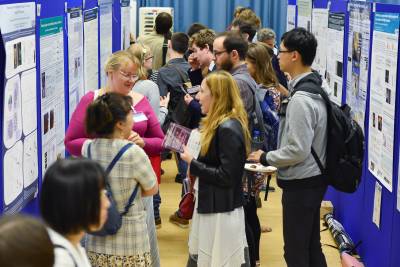
There was a second poster session and a parallel workshop, sponsored by Spectra-Physics, on recent advances in two-photon and three-photon microscopy
Professor Maria Fitzgerald then chaired the second session of UCL speakers. Dr Isaac Bianco spoke on using behavioural tracking, whole-brain imaging of neuronal activity at cellular resolution and closed-loop virtual reality assays to study hunting, escape and sensorimotor processing in the larval zebrafish.
Professor Christiana Ruhrberg presented her work on the cross-talk between neural progenitors, blood vessels and microglia in the developing brain, stressing the importance of taking into consideration the different degrees of interactions if we wish to understand the process as a whole.
Dr Sergi Costafreda González closed the session with his talk on the relationship between hearing loss and risk of dementia, and the need of more funding to translate the discoveries in basic research to the clinic.
Professor Barbara Sahakian from the University of Cambridge delivered the closing keynote. 'Cognitive enhancement in neuropsychiatric disorders and healthy people' commented on how mental disorders disproportionately affect the young and how she and her team are developing new ways to assess cognitive abilities and study the effects of "smart" drugs in patients and healthy subjects.
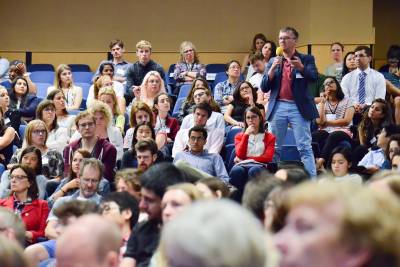
She also shared some interesting insights on the possible reasons behind healthy people using cognitive enhancing drugs and encouraged us all to engage the public with our new ideas.
After the final round of applause, Professor Trevor Smart made the closing remarks, awarded the Early Career Prizes and revealed the winners of the coveted Laboratory Poster Prizes: this year's winner was Professor Rachael Pearson's Lab poster on "Cell based therapies for retinal repair", with the runner-up prize going to Professor Sara Mole's Lab poster on "Batten disease".
The symposium celebrates the scientific achievements of the year while keeping an eye on the ones that are yet to come.
2015 UCL Neuroscience Symposium
Written by Lea Goetz, PhD Student at the Wolfson Institute for Biomedical Research
I always look forward to scientific meetings: they provide a chance to get feedback on my work and to catch up on the research and life of other scientists, many of them being friends. In particular, UCL's Annual Neuroscience Symposium, which took place last Friday, brought together over 800 attendees from UCL's Neuroscience community and beyond to show off their diversity and excellence.
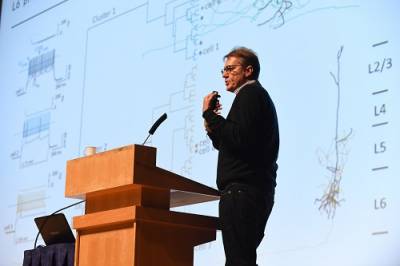
The day started with a keynote speech from Professor Troy Margrie of the new Sainsbury Wellcome Centre. Professor Margrie studies the olfactory system in mice to understand how properties of single nerve cells reflect different kinds of sensory information they process. His research represents one colour in a broad spectrum of neuroscience at UCL. To cover all the facets would be beyond the scope of this article so I will rather concentrate on a few examples.
Several speakers demonstrated how clinical practice and neuroscience research at UCL go hand in hand. A good example is Dr Elvira Brannon, a practising clinician who also leads a laboratory at UCL's Division of Psychiatry. Her work focuses on biological markers for psychosis - the behavioural symptoms of which she observes in her patients every day. One of her patients wrote to her for advice: would his children be at risk of having a psychotic disorder, given that both he and his partner showed symptoms? Elvira Brannon explained how understanding the genetic basis of psychosis can help her to calculate this risk.
Another clinician, Prof David Skuse chose to take a critical look at the concept of autism. The prevalence of autism shows a remarkable increase: studies from the 70s record one autistic child in 5000, while today the ratio is one in only 68. We might then ask: "are we all on the autism spectrum?" and Prof Skuse discussed how different reporting schemes and an understanding of the symptoms has changed our view of autism.
Besides demonstrating the relevance of its research, a major aim of the UCL Neuroscience domain is to encourage and highlight excellence. Hence one of the highlights of the symposium was the talks by the winners of the Early Career Neuroscience Prize. The prize in the advanced category was shared by Dr Teresa Niccoli and Dr Sarah Mizielinska, at the Department of Genetics, Evolution and Environment, and the Institute of Neurology, respectively. Both of them study the mechanisms underlying neurodegeneration as for example in Alzheimer's disease. Their prize-winning study was recently published in Science and investigates genetic causes of a certain type of dementia. They use the fruit fly as a model organism to show that both defective proteins and the RNA encoding for them are toxic for neurons and thus contribute to neurodegeneration.
The prize in the junior category was awarded to Dr Adam Packer, working with Prof Michael Hausser at the Wolfson Institute for Biomedical Research. He has developed an imaging system using holographic technology, which allows him to simultaneously monitor and manipulate the activity of many neurons in the intact brain. His imaging set-up is a good example of how new ways to image and manipulate the brain are currently making a big impact in Neuroscience.
When developing completely new systems, researchers like Adam Packer need to work closely with the companies that produce biological probes or manufacturers of microscopes and lasers. For this reason, representatives of 12 different biotech companies attended the symposium, to advertise their products and learn about what tools researchers might need for their experiments. In addition, a special workshop on "Multiphoton microscopy and the neurosciences" was sponsored by Coherent.
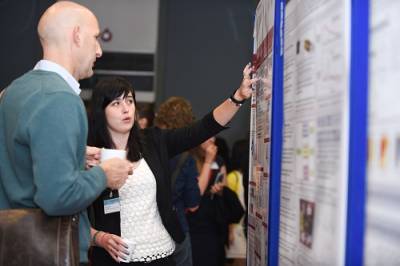
My personal highlight was the poster sessions: as a presenter, I valued the discussions and feedback on my research; as an observer, I got the chance to learn something new and ask questions. A total of 138 researchers presented their work, and the exhibition halls were packed with people who wanted to see it -- some discussions at the poster boards continued long after the sessions had started again.
In addition to individual research posters, the UCL Neuroscience Symposium featured a competition of lab posters that introduced the research agenda of whole laboratories. The winning poster came from the group of Dr Maria Chait (at the UCL Ear Institute), working on how the brain makes sense of sound, with the runner-up by Prof Patricia Salinas' lab (at the UCL Department of Cell and Developmental Biology), who is trying to understand the mechanisms that trigger the degeneration of nerve cell contacts and their recovery.
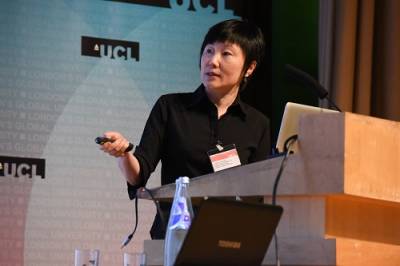
The day finished with a keynote talk by Prof Yang Dan, who was visiting from the University of California, Berkeley.
She described the neural mechanisms that underlie different brain states, such as sleep and wakefulness. She provoked by far the most questions from the audience and stimulated a lively discussion, providing an appropriate climax to the symposium. Had I been wondering why I chose to study Neuroscience at UCL, Friday reminded me of it: the symposium really demonstrated the diversity of research, and in particular collaborations in the Neuroscience domain, and I left it with a feeling of excitement.
UCL Neuroscience Symposium 2014: An Overview
By Guest Blogger, on 2 July 2014
Written by Jack Moore, PhD student
With over 800 people attending and almost 200 posters being presented, there was a real sense of excitement around the halls of the Institute of Education (IoE) where the 5th annual UCL Neuroscience symposium was held on 19 June.
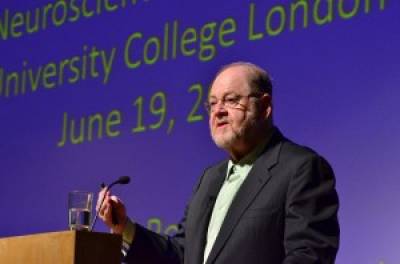
With so many people at the event, and so much being presented, it was a great opportunity to discover what other researchers have been doing and share thoughts on the latest developments. Over the years the event has only got bigger, with the entry queue this year winding all the way up the stairs of the IoE.
The day began with last year's Nobel Prize winner, Professor James Rothman (Yale University), giving a thought-provoking opening keynote speech on how calcium controls neurotransmitter release to a packed auditorium of both students and staff. As Professor Rothman is a Professorial Research Associate in the UCL Institute of Neurology, it seemed a fitting way to begin a symposium in which such a diverse and successful domain get a chance to come together and learn about what is being achieved by different institutes and laboratories.
After the applause for Professor Rothman had quietened down, everyone finally had a chance to see all 180 posters on offer at the event. Dr Martine Groen, who was on the panel deciding this year's Laboratory Poster Prize, told me the winning poster would have to be one that was nice to read and walk through, making clear what the research question is and why it is interesting.
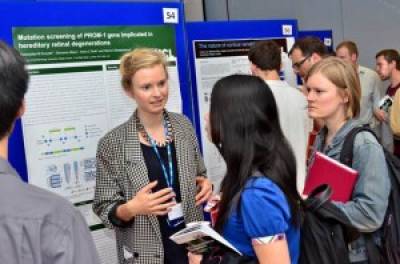
The panel were going to have a hard to time deciding the winner with such a varied range of topics covered by the 32 laboratory posters. This can also be said of the 150 research posters, covering everything from the physical functioning of neurons, to how this translates into our actions and the brains degeneration, to research techniques.
The second session of talks began with session chair Professor Linda Greensmith from the UCL Institute of Neurology introducing speakers from numerous different fields of neuroscience, including Dr Luca Crepaldi, the first of two Early Career Prize winners.
UCL Provost and President Professor Michael Arthur closed the session, expressing his pride in the research being conducted across the UCL Neuroscience Domain, with 500 research groups, 2,000 members and twice as many publications as any other institution in Europe.
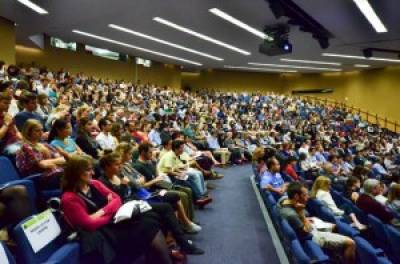
As everyone made their way to lunch he, half jokingly, mentioned that it would be great if we could overtake Harvard to become No. 1 for publications worldwide and pledged to support neuroscience at UCL as much as possible.
Along with the posters, many companies had also come to the event to advertise the latest developments in brain imaging technology and experimental tools, as well as organisations looking for potential employees. There was something for everyone, from students to professors, to have a look at.
The final session began with prizes still to be handed out for the best laboratory poster. We heard Professor Nick Fox talk of his important work on neurodegeneration and Professor Cathy Price talk about her work on speech recovery after stroke.
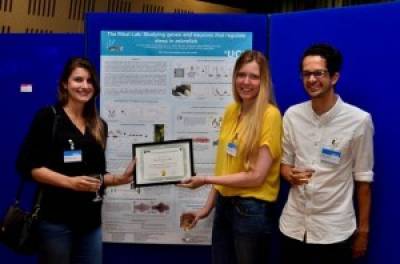
Then Dr Barney Bryson stepped up to claim his Early Career Prize award and show all of us how he has managed to use light image to control firing of stem cell derived motor neurons in mice to restore muscle function, a talk that many, including Professor Cori Bargmann from The Rockefeller University who gave the closing key note speech, considered a personal highlight when discussing the event at the wine reception afterwards.
Professor Trevor Smart, Chair of the UCL Neuroscience Domain, then handed the laboratory poster prize to Dr Jason Rihel for his poster on how genes and neurons regulate sleep in Zebrafish, improving our understanding of what moderates sleep/wake cycles, and closed the event.
With so many posters at the event and talks covering a whole array of fields, many stayed around to enjoy some wine and share their opinions and views on the various topics covered during the day. It was great to see everyone from MSc students to Professors exchanging ideas and theories.
Next year I am sure the event will continue to grow and maybe by then we will have achieved President Arthur's half joking remark: overtaking Harvard on the publications leaderboard.
If you wish to find out more, please visit http://www.ucl.ac.uk/research/domains/neuroscience/events/2014-neuroscience-symposium
Counting Sheep, The Science of Sleep
By Guest Bloggers, on Friday 14 March 2014
Written by Ida Barlow and Julia Hill (PhD students from UCL's Department of Cell and Developmental Biology)
On Friday 14 March UCL's Professor Vince Walsh (Institute of Cognitive
Neuroscience) was joined by Professor Russell
Foster and other sleep experts for an interactive evening of science, art and
improvised opera exploring the stuff that dreams are made of. The Brain
Awareness Week event was the fourth collaborative event between UCL
Neuroscience and the Science Team at the British Library.
Russell Foster - Rhythms of Life
The evening began with a talk by Russell Foster, Professor of Circadian
Neuroscience at the University
of Oxford, on the
'Rhythms of Life'. His main focus was on physical and mental health issues,
sleep deprivation, and the important role of the eye in regulating our
circadian clocks and sleep cycles.
He
emphasised the vital role sleep plays in all of our lives, not surprising when
you consider that we each spend 36% of our lives sleeping - that's compared to
11% watching TV and a startlingly small 3% socialising. Underlining just how
important a good night's rest is, Russell told us that in a study of healthy
young men who were sleep deprived for seven days, their consumption of carbohydrates
increased by 35%, bad news for any dieting night owls.
Furthermore, changes in the sleep cycle pattern have been implicated as an
early warning sign of changes in mental health, proving just how worrying it is
that many of us are disrupting this cycle with artificial stimulants -
caffeine, nicotine, sleeping pills, and alcohol or, as Phil from Impropera
prefers to call it, "a perfect day."
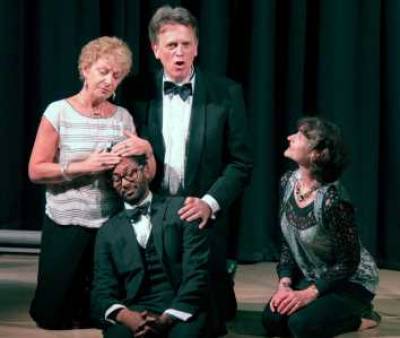
Improvised opera - a dream come true
Impropera
followed Russell's talk with a wonderfully entertaining improvised opera
performance, into which they managed to fit all of the disconnected words the
audience suggested - "Felix," "Bombay,"
"eat your broccoli," and "toaster"- and, most impressively, find a rhyme for
"circadian cycle". Sadly they decided shortly before their performance that
they would not, after all, perform in their dressing gowns!
Regaining our breath after the hilarity of Impropera, we sought-out a tasty sleep themed cocktail, dreamed up by the appropriately named pop up bar Alchemist Dreams. As we wanted to pay attention during the second half we sadly only tried one, but can confirm that the Alice in Wonderland inspired "drink me" (a concoction of chocolate, ginger and butterfly pea flower liqueur) was delicious. Wandering around, sipping on our cocktails, we explored the breakout rooms in the British Library's Conference Centre. For the curious, a sleep quiz and general Q&A hosted by two of Russell's colleagues from Oxford allowed attendees to top-up their sleep knowledge. For the more soporific among us entertainment was provided in the form of lullabies, and the sounds of sleeping (snoring?) seals, dormice and humans, and wonderful artwork demonstrating how sleep has been portrayed over the centuries.
The sleep of reason
Vince Walsh, the host for the evening from UCL's Institute of Cognitive Neuroscience, veered us back on to the scientific track after the interval by giving us a sleep-sourced makeover: 'The Sleep of Reason' - how sleeping can make us smarter, thinner, and live longer.
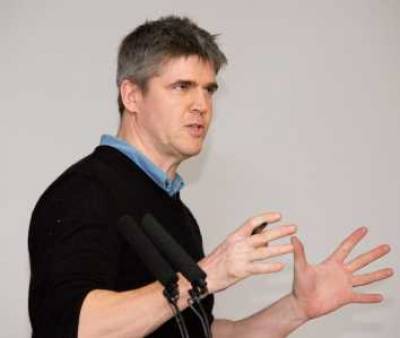
Our makeover included insight into how sleep affects not only our health and wellbeing, but also our perception. Vince started off by presenting results involving rigorous cognitive performance testing, demonstrating that problem-solving skills are improved simply by having a little shut-eye, which, by allowing your brain to gain insight, improves memory and cognition. Veritable proof of the phrase, "Just sleep on it!"
The second stop on our makeover required us to pick out the 'ugly' pictures of celebrities (not real pictures, unfortunately, just the distorted faces of Angelina Jolie and George Clooney). Evidence from these experiments suggests that as we slumber, our visual perceptions change sufficiently to make objects appear thinner. There you go, you really can lose a few pounds overnight.
Final stop - how to live longer. The answer: sleep. Studies on 23,000 Greeks showed that those who regularly took naps had 37% lower mortality during the six year study. Never a bad word about napping can be said again.
Fortunately, all the talk of sleep hadn't led the audience into a state of slumber, and the lively Q&A session at the end was filled with diverse and thought-provoking questions, from how the menopause and sex influence sleep, to meditation and holistic therapy. To close, some parting words of generous advice from Vince: Sleep is free, so go grab some.
Further Links:
All images in this blog are used with the kind permission of ©The British Library Board
Guest bloggers Ida Barlow and Julia Hill are PhD students from UCL's Department of Cell and Developmental Biology. Ida joined Jason Rihel's lab in January 2013. Ida studied Molecular and Cellular Biochemistry at Oxford University and earned her degree in 2012. Julia is a PhD student in the Duchen lab. Julia studied Biochemistry at the University of Bath and also earned her degree in 2012.
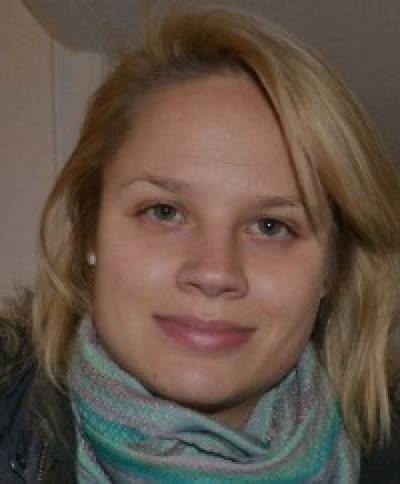 |
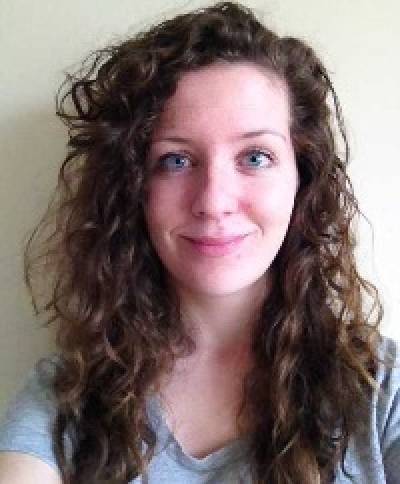 |
 Close
Close

